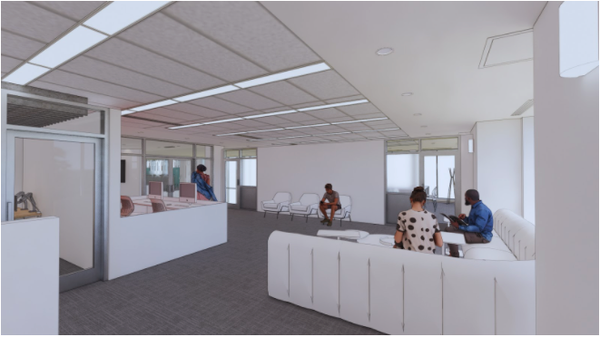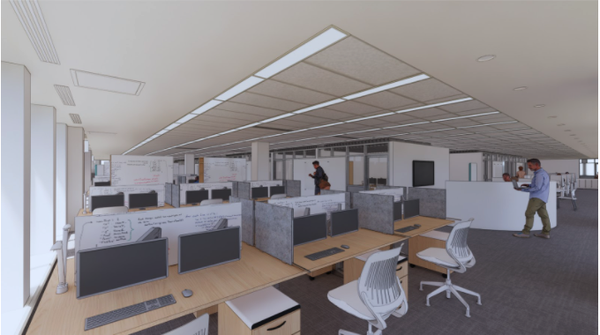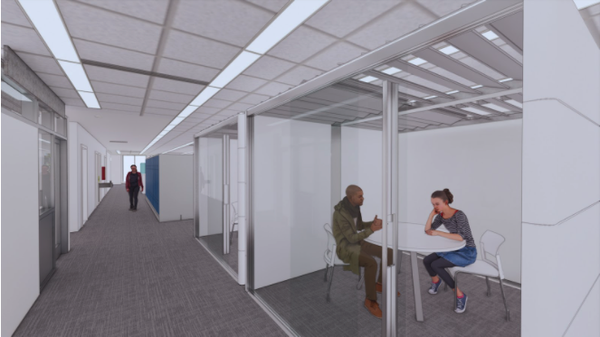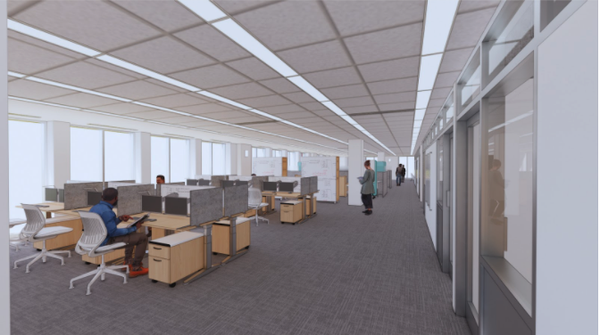Libraries Offsite Shelving + iSchool Retrofit
The UW Libraries and UW Information School (iSchool) collaborative offsite shelving and retrofit project will allow both the Libraries and the iSchool to address long-standing space challenges while increasing opportunities for synergistic collaboration on campus. SKG is leading the design/build process in conjunction with stakeholder groups from both the Libraries and iSchool. Collaborative space within the Libraries will provide opportunities to increase student engagement and leading-edge research through multiple intersecting fields such as mis- and disinformation, civic engagement, library science, digital and open scholarship, knowledge systems, data science, learning sciences and more — critical issues within the field of librarianship and growing areas of excellence within the UW.
The project has two components:
- Phase 1: Significant expansion of climate-controlled off-site storage for UW Libraries collections.
To address the Libraries’ longstanding need for additional climate-controlled storage space for preserving collections, the project includes building out as much as 30,000 square feet of new climate controlled shelving space at an off-campus facility, allowing the Libraries to better protect at-risk collections on campus, including the East Asia Library collection in the Tateuchi East Asia Library Auxiliary Stacks. This first phase of the project is tentatively scheduled to begin spring 2022. - Phase 2A: Collection Relocation and Replacement.
When the off-site storage space is completed around the end of August 2022, the Libraries can begin the process of reorganizing and relocating Libraries collections and books from Allen South and the Tateuchi East Asia Library auxiliary storage areas to the new facility. With more than 600,000 items to transfer, this process is expected to take about four months. - Phase 2B: Retrofit of Allen Library South 1st Floor to increase student engagement and provide space for leading-edge research.
The first floor space in Allen Library will be retrofitted to become a home for iSchool programs with strong connections to the academic and public mission of UW Libraries, including the Technology & Social Change Group (TASCHA) and the Distinguished Practitioner in Residence. The renovation will include collaboration spaces, open workstation areas and offices for student, faculty and staff researchers. The goal being to provide a temporary home for iSchool programs until a permanent space allowing full consolidation of the iSchool is identified. This final phase of the project is expected to begin in early 2023.
The project is estimated to be completed by summer 2023. While it's difficult to predict the exact timeline for major infrastructure projects, the iSchool’s residency in the Libraries is considered to be a multi-year prospect that is designed to benefit both units in many ways given the synergies outlined here.
The estimated total cost of the project is $9.65 million, funded jointly by UW Libraries and an associated FAST loan and additional, critical funding from the iSchool, Provost and UW Facilities.
The iSchool space plan for Allen Library South (1st floor) includes private offices, staff and student workstations, quiet areas and collaborative spaces.
Goals
- to ensure long-term, responsible stewardship of the Libraries' distinctive and valuable collections;
- to serve UW students through Libraries initiatives to provide innovative study and collaboration space;
- and to support funded research and academics within fields that are synergistic with the Libraries.
Design/Build Partners
GLY Construction, SHKS Architects, PCS Structural Solutions, FSI Engineers, Apollo, Glumac
Timeline
April 2021 - March 2022
Planning & Design
April 2022 - August 2022
Construction Off-site Storage
September 2022 - mid-January 2023
Move Libraries Collections
mid-January 2023 - May 2023
Construction Allen Library South 1st Floor Retrofit
Contact
The UW Libraries and the UW iSchool are committed to providing transparent communication on the project development and programmatic impacts as new information becomes available.



